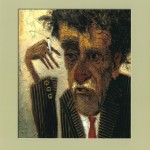Each week in Eat Your Vegetables, Jonathan Sircy shares the benefit and appeal of some of the culture’s more inaccessible or intimidating artifacts.
Cultural Vegetable of the Week: Mother Night (Kurt Vonnegut, 1961)
Nutritional Value: A parable on the perils of pretending
In Mother Night’s introduction, Kurt Vonnegut says his third novel has three morals. In order, they are:
- “We are what we pretend to be, so we must be careful about what we pretend to be.”
- “When you’re dead you’re dead.”
- “Make love when you can. It’s good for you.”
Vonnegut is pulling the audience’s leg. The novel’s real moral is the first one. The other two are examples of a superfluous fortune cookie wisdom that, while certainly true to the Vonnegut ethos, doesn’t really have anything to do with the novel. They’re still funny. So is the novel. They’re also short. That’s like the novel, too.
The novel offers a parable on the cost of losing your ethical identity, or more precisely, the cost of remaining unaware of your moral identity. The novel demonstrates that you never lose something like that. You can remain ignorant of it, but it’s always there.
The novel’s protagonist is Howard J. Campbell, an American transplant in post-World War I Germany who takes a German wife even as the National Socialist party emerges from the rubble of the Weimar era. As World War II starts, Campbell finds himself a rather successful playwright in the German language and decides to stay in Germany, avowedly loving his wife more than any political party. But the war will not allow him to remain neutral. His skill with language draws the attention of the Nazi propaganda machine, even as his American citizenship and German military connections draw the attention of the United States government. A nondescript American agent approaches Campbell with a mission: keep acting like a Nazi spy, spouting race-baiting propaganda… but with a catch. Campbell will get non-verbal cues from an unknown source that he will insert into his speeches: coughs, pauses, etc. Those cues will be a code. To the world, Campbell will be a Nazi. To a few people in American intelligence (including FDR), Campbell will be an American patriot. The novel plays out the ramifications of Campbell’s ethical bargain.
Mother Night has all the hallmarks of post-war American fiction: its awareness of itself as text, a preoccupation with the madness of the nuclear age, the ethical quagmire of a post-Holocaust world, and the inability for any author to control the meaning of his own work. For instance, Campbell never knows the messages he’s communicating. His disingenuous propaganda becomes gospel to everyone from his father-in-law to American ne’er-do-wells who see Campbell as an American hero… precisely because he’s a race-baiting Nazi. But Campbell himself never knows what it is he really means.
When the war is over, Campbell is captured but released through a series of technicalities implicitly but not overtly related to his intelligence work. To the world, he remains a Nazi. Because much of the novel takes place after World War II, Vonnegut has ample opportunity to satirize the ethical absurdity of post-war America. Vonnegut sees Americans either stuck in the past glories of World War II or silently assenting to different forms of racial prejudice. The only people who befriend Campbell are Russian agents. It is Yeats’s “The Second Coming” realized: “the best lack all conviction, while the worst / Are full of passionate intensity.” The novel’s title comes from Goethe’s Faust, where Mephistopheles maintains Mother Night came first, that it was darkness that came before light rather than vice versa. In this way, Vonnegut maintains that a depraved America, and by extension the world, is merely returning to the night from whence it sprang.
Does Vonnegut’s first moral have biblical precedent? Only when applied negatively. Someone can’t pretend to be a good person and have the masquerade stick. “Truly I say to you,” Jesus says in Mark, these pretenders “have their reward in full”; their transformation doesn’t effect any real spiritual change. But as a diagnosis of a particular type of religious behavior, however — a decidedly negative one — the moral is incredibly apt. This novel warns the grace-spouting scofflaw who signifies a tare while maintaining that he is inwardly wheat: you are what you pretend to be.











